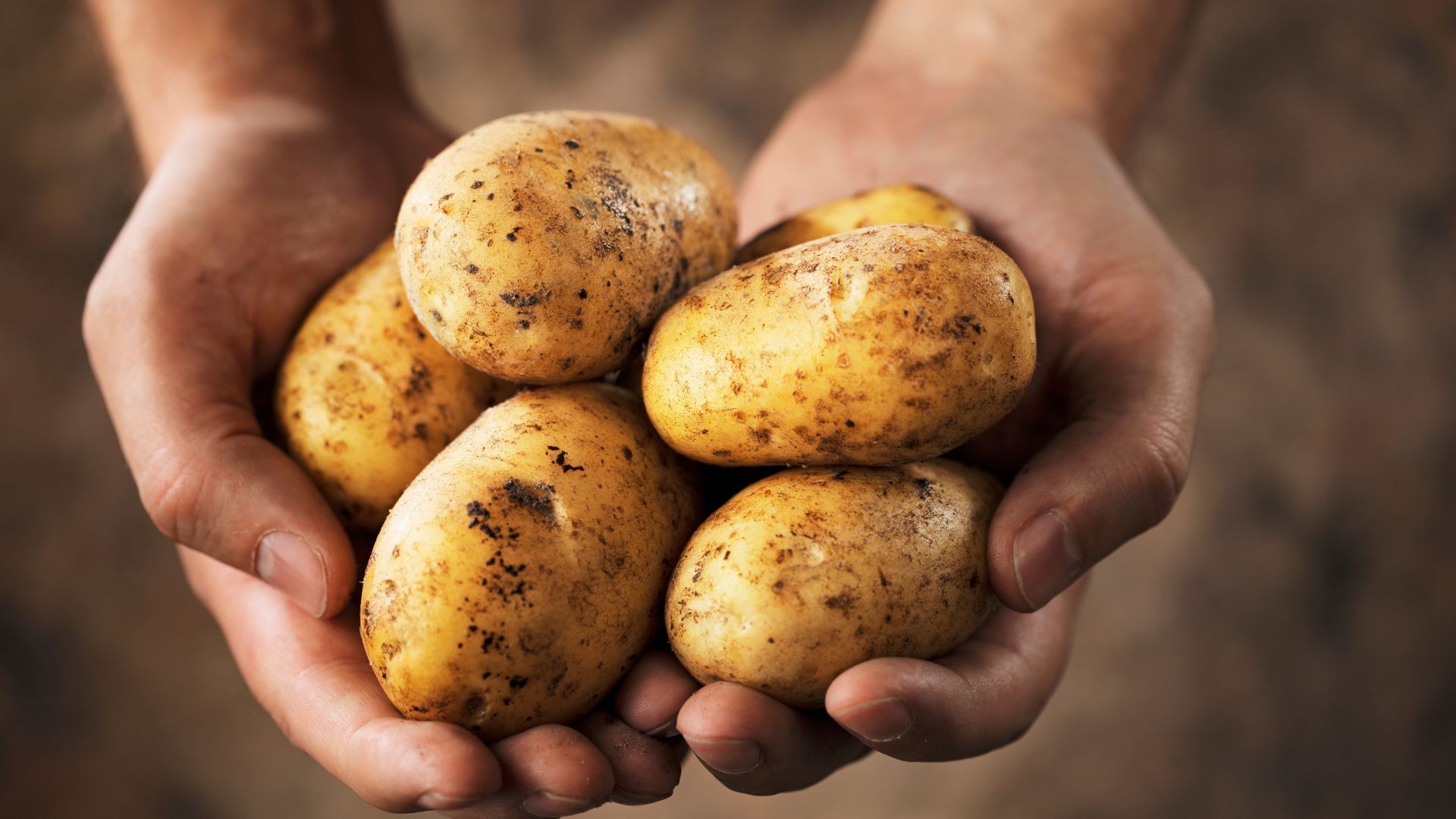The Health Benefits Of Potatoes
Feb 14, 2025
The humble spud. Why has it had such a bad wrap? People seem less scared of death than they are of eating a potato these days. If you come to my house on a Sunday you will be fed your own body weight in roast potatoes. Ultra crunchy and fluffy inside. Does it get much better?
Potatoes (Solanum tuberosum) are one of the most widely consumed staple foods globally, providing a valuable source of carbohydrates, fibre, vitamins, and minerals. While often mischaracterised as unhealthy due to their carbohydrate content, potatoes are in fact highly nutritious and offer numerous health benefits. Different varieties, including white, red, yellow, and purple potatoes, contain unique bioactive compounds that contribute to overall health. This article provides a scientifically detailed examination of the health benefits of potatoes, including their nutritional value, digestive health benefits, immune support, metabolic effects, and potential roles in disease prevention.
Potatoes are particularly rich in potassium, which supports cardiovascular health, and vitamin C, which enhances immune function. Different potato varieties also contain unique phytochemicals, with purple and red potatoes being high in anthocyanins, known for their antioxidant and anti-inflammatory properties (Lachman et al., 2013).
Digestive Health and Prebiotic Benefits
Potatoes contain both soluble and insoluble fibre, which support digestive health. The resistant starch found in cooled, cooked potatoes functions as a prebiotic, feeding beneficial gut bacteria such as Bifidobacteria and Lactobacilli (Slavin, 2013). Resistant starch has been shown to improve gut barrier integrity, enhance nutrient absorption, and reduce inflammation in the digestive tract (Zaman & Sarbini, 2016).
Insoluble fibre in potatoes adds bulk to stool and prevents constipation, while soluble fibre stabilises blood sugar levelsby slowing digestion (Eswaran et al., 2013). Studies suggest that resistant starch may also reduce the risk of colorectal cancer by promoting short-chain fatty acid (SCFA) production in the gut (Topping & Clifton, 2001).
Blood Sugar Regulation and Metabolic Health
Now this one IS a shocker. Despite being a carbohydrate-rich food, potatoes have a variable glycaemic index (GI) depending on their preparation. Boiled and cooled potatoes have a lower GI due to their resistant starch content, while fried or mashed potatoes tend to have a higher GI, leading to more rapid blood sugar spikes (Atkinson et al., 2008).
Resistant starch in potatoes enhances insulin sensitivity and may help regulate postprandial glucose levels, making them a beneficial food for individuals with type 2 diabetes (Johnston et al., 2010). Additionally, their high potassium and magnesium content contributes to insulin function and glucose metabolism (Rodriguez-Moran & Guerrero-Romero, 2003).
Cardiovascular Benefits
Potatoes contribute to heart health due to their high potassium content, which plays a crucial role in blood pressure regulation. Potassium helps counteract sodium-induced hypertension, supporting vascular function and reducing stroke risk (He & MacGregor, 2008).
In addition to potassium, polyphenols in potatoes, especially in coloured varieties like purple and red potatoes, have been shown to improve endothelial function and reduce LDL cholesterol oxidation, lowering the risk of atherosclerosis (Lachman et al., 2013).
Antioxidant and Anti-Inflammatory Properties
Potatoes contain a variety of antioxidants, including vitamin C, polyphenols, and carotenoids, which help combat oxidative stress and reduce inflammation. Anthocyanins in purple and red potatoes have been shown to modulate inflammatory pathways, including nuclear factor kappa B (NF-κB) signalling, which is implicated in chronic diseases (Lachman et al., 2013).
Studies indicate that potato polyphenols reduce markers of inflammation, such as C-reactive protein (CRP), potentially lowering the risk of cardiovascular disease and metabolic syndrome (McGill et al., 2013).
Immune System Support
Potatoes are an excellent source of vitamin C, an essential nutrient for immune function. Vitamin C enhances the production of white blood cells, supports antioxidant defences, and strengthens skin and mucosal barriers against pathogens (Carr & Maggini, 2017).
Additionally, zinc and polyphenols found in potatoes contribute to immune modulation, reducing excessive inflammatory responses while supporting the body’s ability to combat infections (Gibson et al., 2017).
Potential Anti-Cancer Properties
Emerging research suggests that the polyphenols and resistant starch in potatoes may have cancer-preventive properties. The fermentation of resistant starch produces short-chain fatty acids (SCFAs) such as butyrate, which has been shown to reduce tumour growth and promote healthy colon cells (Topping & Clifton, 2001).
Epidemiological studies have linked a diet rich in polyphenol-containing vegetables, including potatoes, to a lower risk of certain cancers, particularly colorectal and gastric cancers (Lachman et al., 2013).
Bone Health and Nutrient Absorption
Potatoes contain key minerals such as potassium, magnesium, and phosphorus, which contribute to bone health. Magnesium plays a role in bone mineralisation, while potassium helps reduce bone resorption and maintain alkaline balance, supporting skeletal strength (New et al., 2016).
Additionally, vitamin C in potatoes is essential for collagen synthesis, which plays a critical role in bone density and joint health (Booth, 2012).
Considerations and Potential Side Effects
While potatoes offer numerous health benefits, preparation methods significantly impact their nutritional value. Boiling or baking potatoes preserves their nutrient content, whereas frying can introduce unhealthy trans fats and increase caloric density.
Additionally, green potatoes contain solanine, a glycoalkaloid that can be toxic in high amounts. Proper storage away from light and heat can prevent solanine accumulation (Friedman, 2006).
Nutritional Composition of Potatoes
Potatoes provide a wide array of essential macronutrients and micronutrients. A 100g serving of boiled potatoes (with skin) contains approximately:
-
Energy: 87 kcal
-
Carbohydrates: 20.1g (including 0.9g sugar and 1.8g dietary fibre)
-
Protein: 1.9g
-
Fat: 0.1g
-
Vitamin C: 19.7mg (22% of the recommended daily intake, RDI)
-
Vitamin B6: 0.3mg (15% RDI)
-
Potassium: 429mg (12% RDI)
-
Magnesium: 23mg (6% RDI)
-
Folate: 18μg (5% RDI)
Best Way To Use
Roast them. Go on....you know you want to.
Conclusion
Potatoes are a nutrient-dense food with numerous health benefits. Their high fibre content, resistant starch, antioxidants, and essential nutrients contribute to digestive support, cardiovascular protection, immune function enhancement, blood sugar regulation, and potential cancer prevention. Including different potato varieties, particularly coloured ones, in a balanced diet can support overall well-being and reduce the risk of chronic diseases.
References
-
Atkinson, F.S., et al., 2008. International tables of glycaemic index and glycaemic load values. Diabetes Care, 31(12), pp.2281-2283.
-
Carr, A.C. & Maggini, S., 2017. Vitamin C and immune function. Nutrients, 9(11), p.1211.
-
Friedman, M., 2006. Potato glycoalkaloids and metabolites: Roles in the plant and in the diet. Journal of Agricultural and Food Chemistry, 54(23), pp.8655-8681.
-
He, F.J. & MacGregor, G.A., 2008. Beneficial effects of potassium on human health. Physiologia Plantarum, 133(4), pp.725-735.
-
Slavin, J., 2013. Dietary fibre and gut health. Nutrition Reviews, 71(9), pp.561-582.




